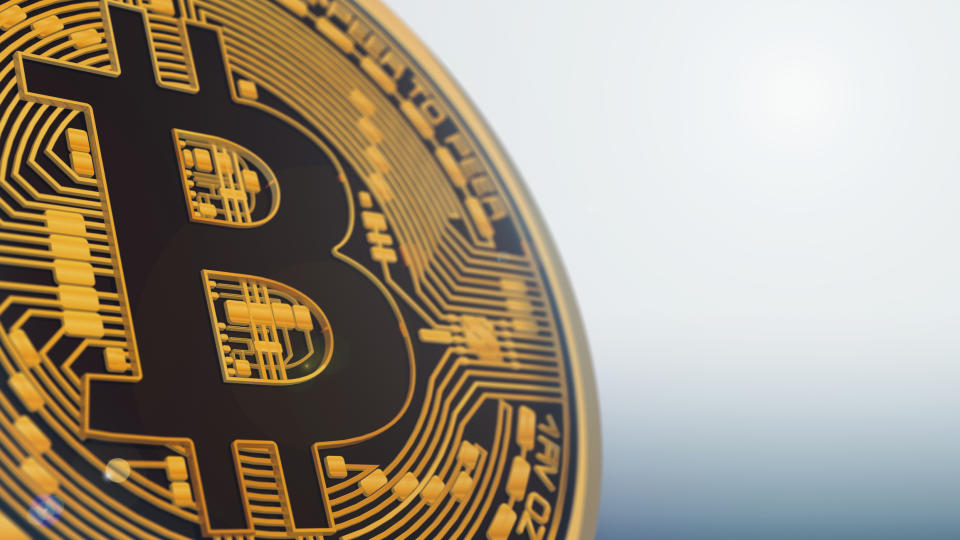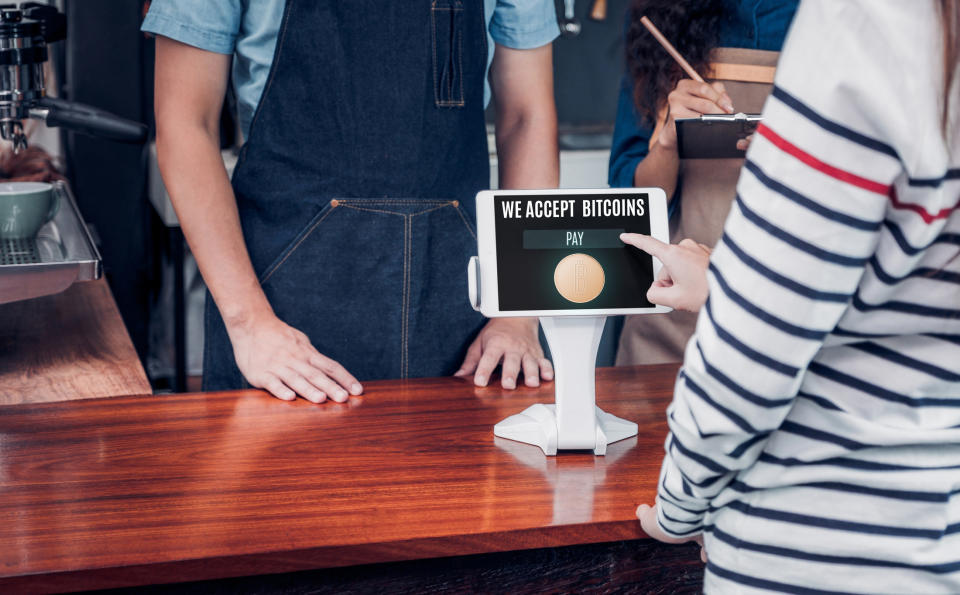3 Reasons Bitcoin Is Fundamentally Flawed as an Investment
It's back... and I'm not talking about the mosquito invasion on the back porch that comes with summer solstice.
After a miserable 2018 that saw leading cryptocurrency bitcoin (CCC: BTC-USD) lose around 80% of its value, 2019 has been a completely different story for the digital token. On a year-to-date basis through Saturday evening, June 22, bitcoin had returned 176%, which is about a ninefold better return than the broad-based S&P 500 on a year-to-date basis. After being within striking distance of the $10,000 level for weeks, bitcoin blew through this psychological level and wound up briefly surpassing $11,200 per token.
The big question is, "Why?" Why is bitcoin suddenly finding success after more than a year of wallowing in the doldrums? The answer lies with a host of factors, rather than just a single catalyst.

Image source: Getty Images.
Bitcoin soars past $11,000
To begin with, bitcoin's block reward is expected to be halved on May 21, 2020. Cryptocurrency miners -- i.e., people and businesses with high-powered computers that solve complex math equations to prove the validity of crypto transactions on a blockchain -- feast on these rewards, which are currently paid out as 12.5 bitcoin tokens per block of transactions proofed. At today's price, that works out to close to $135,000 per bitcoin block reward. But with this reward being halved in May 2020 to 6.25 bitcoin per block solved, investors and miners have historically bid up the digital token about a year in advance of a halving event.
Another reason bitcoin investors are excited is the possibility of the Securities and Exchange Commission (SEC) allowing a bitcoin exchange-traded fund (ETF) on a major U.S. exchange. The SEC has delayed its decision on a bitcoin ETF on multiple occasions, but announced in early April that it wanted to hire a cryptocurrency specialist to help with implementing regulations. This move, along with the SEC currently taking comments and rebuttals on a bitcoin ETF, suggests that the prospects of a bitcoin ETF hitting the U.S. major exchanges are improving.
The recent announcement that social media giant Facebook (NASDAQ: FB) would be creating its own crypto token, known as Libra, is also encouraging to bitcoin investors. Facebook has 2.38 billion monthly active users, and there's a really good bet that most of them have little or no clue what blockchain is. Libra is a means of educating the world about the potential for the digital ledger known as blockchain, as well as the utility of cryptocurrency tokens. Facebook plans to launch its new digital token next year, and the buzz leading up to this launch may drive bitcoin higher.

Image source: Getty Images.
Face the facts: Bitcoin is fundamentally flawed as an investment
But in spite of all the reasons bitcoin is advancing, the most popular cryptocurrency in the world has three fundamental flaws that, as I see it, are practically impossible to fix.
1. Bitcoin isn't really "scarce"
One of the more common arguments from bitcoin bulls as to why it's worth so much is its perceived scarcity. As noted earlier, proofing transactions does lead to inflation in the form of 12.5 bitcoin being added to the existing circulation per block. However, the maximum number of bitcoin that can be produced is capped at 21 million, with 17.77 million bitcoin tokens already in circulation. With an annual bitcoin token inflation rate of just 3.77% (until the halving in May 2020), optimists would argue that bitcoin's scarcity makes it an intriguing buy.
But there's a catch to this figure. Namely, there's no hard cap on the number of tokens that are in circulation. Rather, it's computer code and community consensus that determine this cap. Although it's unlikely that consensus would be reached to increase the 21 million token cap, the possibility of this happening is not 0%.
Comparatively, a physical store of value like gold is a finite asset. The gold that's currently in the ground, or has been mined, is all there will ever be on this planet, unless some miracle form of alchemy is invented in the future. That's in stark contrast to bitcoin, which could have its token cap adjusted based on community consensus.
In short, bitcoin really isn't as scarce as people think.

Image source: Getty Images.
2. Bitcoin, like most digital tokens, has limited utility
A second fundamental flaw with the largest cryptocurrency in the world by market cap is that it has limited utility, or use. Optimists might hail bitcoin as a replacement for cash or the anti-banking currency, but it currently lacks the utility for broad-based adoption.
For starters, bitcoin's volatility is a big reason why most retailers won't accept it. Even with blockchain-based transactions that can potentially validate and settle faster than payments on traditional banking networks, the lag in settlement times can still allow for wild vacillations in the price of bitcoin. According to online blog Blockonomics, Dell, Expedia, Microsoft, PayPal, and Stripe have all dropped payment support for bitcoin. It should be said that while many of these companies cited volatility as a reason to drop bitcoin, variable transaction fees were noted, too.
Bitcoin's 17.77 million circulating coins are also a limiting factor. Since a good chunk of these coins are being held for investment purposes by a small number of wealthy individuals and traders, and are thus out of circulation for an extended period of time, there's simply not that many coins to go around for retail transactions and payments. Unless the bitcoin token cap was raised well beyond 21 million, bitcoin lacks the utility to spur fundamental monetary change.

Image source: Getty Images.
3. You're buying into the wrong asset
Last, but not least, you're buying into the wrong asset when trading cryptocurrencies.
On one hand, there's the digital token, which is what cryptocurrency investors are buying. And on the other hand, there's the underlying blockchain, which is that aforementioned digital ledger that transparently and immutably records transactions. Blockchain is where the real evolution and innovation of the cryptocurrency movement lies.
Here's the problem: Buying a cryptocurrency token (bitcoin or most any other) does not give investors any ownership in the underlying blockchain. If the underlying blockchain of a crypto token becomes the basis for innovation at a particular company or within an industry, its associated token isn't necessarily going to benefit (and neither will token-holders). In fact, companies are developing their own tokens for use on in-house-created blockchains, or creating token-less blockchains that work with fiat currencies, such as the U.S. dollar.
If you want to invest in the underlying innovation of the crypto movement, you'd be better served by buying into a company like IBM (NYSE: IBM). Although IBM is still very stodgy in nature and living off of its legacy hardware and software revenue, it's also made an effort to be on the cutting edge of blockchain projects. IBM has been working with about a dozen banks in the South Pacific to improve settlement times on its proprietary blockchain network, and set up a joint venture with shipping giant Maersk in early 2018 to develop blockchain-based shipping solutions to revolutionize supply chain management.
The point being that if you want direct exposure to what matters (i.e., the underlying blockchain), you're going to have to buy stocks developing that blockchain, because purchasing cryptocurrencies like bitcoin won't cut it.
More From The Motley Fool
Teresa Kersten, an employee of LinkedIn, a Microsoft subsidiary, is a member of The Motley Fool's board of directors. Randi Zuckerberg, a former director of market development and spokeswoman for Facebook and sister to its CEO, Mark Zuckerberg, is a member of The Motley Fool's board of directors. Sean Williams has no position in any of the stocks or cryptocurrency tokens mentioned. The Motley Fool owns shares of and recommends Facebook, Microsoft, and PayPal Holdings. The Motley Fool is short shares of IBM, and has no position in any cryptocurrency tokens mentioned. The Motley Fool has a disclosure policy.

 Yahoo Finance
Yahoo Finance 